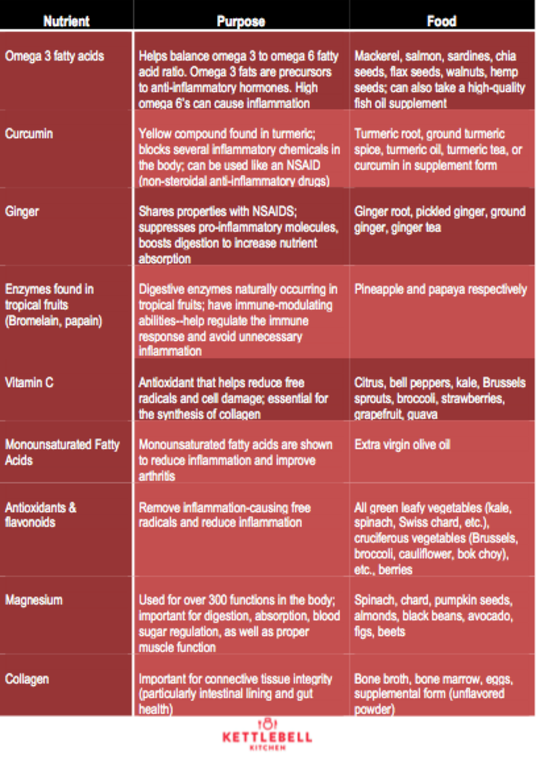Kettlebell Kitchen's Sport Performance Nutrition Series: Part 1
April 27, 2017
Part 1: Inflammatory foods, gut health, and the connection to athletic performance
Written by Kettlebell Kitchen Nutritionists: Amanda Montalvo, RD and Kim Jordan, NTP

Inflammation within the body, and the health of your gut can directly affect your athletic performance. Performance is not only about how many carbs you eat or what supplements you take, but more about the current state of your body. Certain foods cause more inflammation than others. These can differ for every individual; however, certain foods are inflammatory for everyone. These include processed vegetable and seed oils, processed sweeteners, and proteins such as gluten (in wheat, barley, rye), casein (in dairy), and soy.
What is Inflammation: Inflammation is a protective, healing response in the body. However, there is a difference between acute and chronic forms. Acute inflammation often occurs in a localized area, such as injury, infection, or allergic reaction. Short-term illness like cold or flu also spark acute inflammation (for example, fever and mucus production are inflammatory responses). However, chronic inflammation occurs more slowly, lasts longer, and is often subtle; it is like a fire constantly keeping your immune system alert. During chronic inflammation, tissue is destroyed by inflammatory cells and systems within the body become stressed and overworked.
In addition, the same responses that occur when we are sick or injured occur when we workout - we break down muscle and connective tissue, the area becomes inflamed, and the body responds in order to heal. Certain factors (poor diet, lack of sleep, high stress) can interfere with inflammation management, causing a more constant, low-grade inflammation to occur.
Research has also shown that high intensity and endurance athletics can both reduce or increase inflammation. Therefore, it is crucial to find the right balance of exercise for your lifestyle and stress levels, as well as optimize your nutrition.
Inflammatory foods & the effect on the body: Gut tissue integrity is critical for digestive health. Intestinal permeability (“leaky gut syndrome”) refers to wear-and-tear that occurs within the intestines. Microvilli lining the small intestine help to absorb nutrients into the bloodstream, while the intestinal wall serves to keep pathogens out. The villi can become irritated and the intestinal wall weakened by pathogens like food disruptors, bacteria not eliminated due to ineffective stomach acid, and emotional stress.
When the intestines are worn down they are more susceptible to allowing pathogens into the bloodstream. They also cannot absorb micronutrien
ts efficiently, which is especially important for athletes. Your body requires certain vitamins and minerals for proper muscle function, tissue repair, and everyday bodily functions. Gut health is directly proportional to your overall health, performance and recovery. When we continue to eat the foods that damage our digestive systems, the immune system works overtime and gets distracted from its regular roles. If the source of the inflammation is not addressed, it will continue to cause damage.
Eating to combat Inflammation: You can reduce inflammation by changing the foods you eat, keeping your gut healthy, and optimizing supplements you may take. As mentioned, the health of your gut reflects the health of the body. If you aren’t digesting and absorbing food properly, optimizing performance and reducing inflammation is difficult. Reference the chart below for anti-inflammatory recommendations.
Stayed tuned for our next post in the Kettlebell Kitchen Sports Performance Nutrition series that will discuss calories, macros, and nutrient density. We will also outline how to fuel for competition! Need help with your nutrition? Kettlebell Kitchen's Sports Performance Meal Plan is the official meal plan of The D10 New York. Check it out here and use the code D10 when purchasing.
